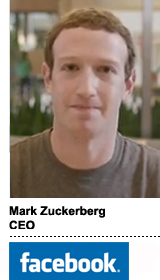 Under mounting pressure over its use by Russian meddlers in the US election, Facebook is imposing new transparency on ad buyers to make it harder to obscure who paid for an ad, and who saw it.
Under mounting pressure over its use by Russian meddlers in the US election, Facebook is imposing new transparency on ad buyers to make it harder to obscure who paid for an ad, and who saw it.
CEO Mark Zuckerberg announced the changes in a Facebook Live video posted Thursday afternoon.
“When someone buys political ads on TV or other media, they’re required by law to disclose who paid for them, but you still don’t know if you’re seeing the same messages as everyone else,” Zuckerberg said in the video, which enumerated nine actions designed to hinder and expose political ad shenanigans on the platform. “So, we’re going to bring Facebook to an even higher standard of transparency.”
He continued, “Not only will you have to disclose which page paid for an ad, but we will also make it so that you can visit an advertiser’s page and see the ads that they are currently running to any audience on Facebook. We will roll this out over the coming months, and we will work with others to create a new standard for transparency in online political ads.”
Zuckerberg called the change “maybe the most important step we’re taking” to prevent the use of its platform to manipulate elections.
However, he did not say how Facebook would determine that an ad is political. Nor did he confirm that commercial marketers would be excluded from the new policy, leaving open the possibility that non-political ads could be caught up in the transparency dragnet.
A source at the company told AdExchanger “it’s too early to say” whether that will happen. Facebook is still evaluating how to show more information about active ads, with the goal of forcing greater transparency in political advertising. The effect on commercial marketers will depend on how Facebook executes that goal.
In addition to increasing ad transparency, Zuckerberg said Facebook will strengthen its review of political ads.
“To be clear, it has always been against our policies to use any of our tools in a way that breaks the law, and we have many controls already in place, but we can do more,” he said. “Most ads are bought programmatically without an advertiser ever speaking to someone at Facebook, and that’s what happened here. But even without our employees directly involved in the sales, we can do better.”
This post was syndicated from Ad Exchanger.

More Stories
The ultimate Songs of the Summer list for NZ TikTok
Revolt Taps Freya Williams As Chief Strategy Officer for North America
KFC’s fish and chips brings Kiwis to the beach